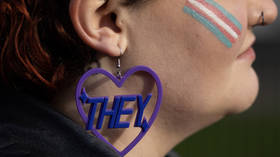Nearly half US millennials think misgendering should be illegal – poll

More millennials support criminalizing misgendering than oppose the idea, a Newsweek poll conducted earlier this month and published on Saturday found. The idea had less support among both younger and older generations.
While 44% of poll respondents aged 25 to 34 said they believe referring to transgender people by the wrong pronouns should be a criminal offense, just 31% disagreed, while the rest were unsure or had no opinion on the matter.
Among the older age bracket of 35 to 44, which includes some millennials, support for criminalizing misgendering fell to 38%, with 35% against the idea.
Perhaps surprisingly, given that more of them identify as LGBTQ+ than any other age group, Generation Z was less likely than its millennial peers to support making incorrect pronoun use a crime - just 33% supported the idea, while 48% opposed it. Their views were more in line with the general US population, just 19% of whom want misgendering to be declared a crime, while 65% object to the idea.
The survey also found a plurality of Americans were willing to refer to transgender individuals by their requested pronouns. A total of 37% said they would call a trans-woman (born male) “she/her” if asked, while 17% said they would continue to use “he/his” and 28% said it would depend on the person asking. Similarly, 38% said they would call a trans-man “he/him” if asked, with 18% refusing and 27% saying it would vary depending on the person.
While the US does not have laws against “hate speech” per se, social media speech codes and their real-life equivalents in academia have encouraged Americans to change the way they talk about sex and gender, emphasizing the adoption of LGBTQ-friendly vocabulary.
At the same time, there has been a meteoric rise in the number of Americans identifying as something other than heterosexual. Last year, a Gallup poll found 7.1% of Americans identified as LGBTQ, more than double the portion who did so in 2012. The increase was most marked among Generation Z, as 21% identified as LGBTQ.
In some cases, however, LGBTQ activism has been met with strong legislative resistance, particularly when it comes to trans-identifying children. This year, Republican-led state governments have passed dozens of bills banning medical procedures and restricting the discussion of LGBTQ issues in the classroom.
In the UK, journalists, activists, and ordinary social media users have been investigated, arrested and charged for misgendering trans people under “harassment” and “malicious communication.”













